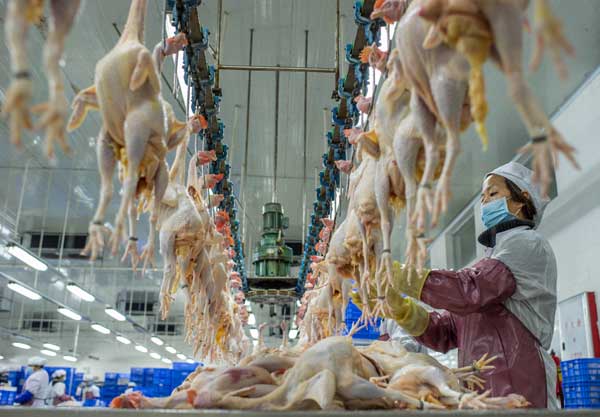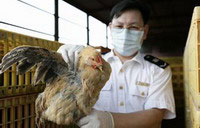Live poultry markets to be closed in S China
Updated: 2014-04-30 02:58
By ZHENG CAIXIONG in Guangzhou (China Daily)
|
||||||||

Workers at a chicken slaughterhouse in Qingyuan, Guangdong province, are busy processing birds as three cities in the province - Guangzhou, Foshan and Shenzhen - ban live poultry markets in selected areas and turn to a centralized slaughtering system. LIU DAWEI/XINHUA
Restaurants say they may stop serving popular chicken dish
|
 |
| Full coverage: Fighting against H7N9 |
The two major downtown districts in Guangzhou — Yuexiu and Liwan — and the mega university town in Panyu district have been selected as pilot areas to require that only frozen poultry be sold at local markets and bazaars starting May 5.
The move aims to prevent people from being infected with bird flu, according to the Guangzhou Administration of Food Safety.
However, the boss of Shengji Lubian Chicken Restaurant said the original flavor and texture of baiqieji (boiled sliced chicken) will be spoiled if frozen chickens are used.
For more than 38 years, the restaurant's chefs have visited chicken farms every day to purchase live chickens, said the boss, who only gave his surname, Lu. "We will not use frozen chickens to cook the restaurant's dish of baiqieji and destroy the restaurant's brand."
According to the food safety administration, all poultry in the three districts will be slaughtered at appointed slaughterhouses and frozen before going to markets.
The centralized slaughter of poultry will be implemented over the entire city in October.
He Jianfeng, chief expert at Guangdong's Center for Disease Control and Prevention, said the centralized system will reduce the number of people who have contact with live poultry and will help lower the risk of being infected with bird flu.
"Many business owners mix their poultry, including chickens, ducks, geese, quails and doves in the coops in markets," he said, which raises the risk of infection.
"Banning live poultry in local markets is of great significance in preventing bird flu from spreading, which has a high annual incidence of flu in winter and spring," he added.
According to a recent survey, as much as 53 percent of Guangzhou residents think banning live poultry in local markets would help improve sanitary conditions in markets and prevent bird flu from spreading. Thirty-eight percent opposed the ban.
More than 66 percent, however, think the original flavor and texture of the dishes will be spoiled when cooked with frozen chickens.
Li Tianzhuo, deputy general manager of Guangzhou Banxi Restaurant, said sales of chicken dishes will witness a drastic decline after live chickens are banned.
Most Viewed
Editor's Picks

|

|

|

|

|

|
Today's Top News
NBA bans Clippers owner from game for life over racist commen
China's CEOs confident
Alibaba IPO could be the biggest
Chinese youths get their chance at stardom and recording deals
Cookiemaker announces plans to roll into smaller cities
Bill Gates urges more in China to help poor
Philippine pact gives US access to air, sea bases
Obama sets new sanctions on Russia
US Weekly

|

|















